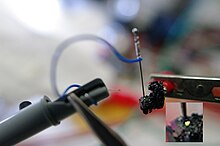
Quick Facts
Biography
Captain Henry Joseph Round (2 June 1881 – 17 August 1966) was an English engineer and one of the early pioneers of radio. He was the first to report observation of electroluminescence from a diode, leading to the discovery of the light-emitting diode. He was a personal assistant to Guglielmo Marconi.
Round was the eldest child of Joseph and Gertrude Round. He spent his early years in the small town of Kingswinford in Staffordshire and received his early education at Cheltenham Grammar School. He later attended the Royal College of Science, a constituent college of Imperial College London where he gained a first class honours degree.
Round joined the Marconi Company in 1902; not long after Marconi had made his transatlantic wireless transmission. He was sent to the USA where he experimented with a variety of different aspects of radio technology, focusing on technologies such as powdered iron cored tuning inductors. He also performed some experiments with transmission paths over land and sea at different times of the day and investigated direction finding, for which he used a frame antenna.
Vacuum tube development
Round made important contributions to development of the first vacuum tubes. He headed Marconi's research program into thermionic tubes, and developed a three-element (triode) amplifying tube at roughly the same time as Lee De Forest was developing the Audion in the US. He discovered feedback (regeneration) in vacuum tubes independently along with Alexander Meissner and Edwin Armstrong, and built some of the first AM vacuum tube radio transmitters. He patented the first design for an indirectly heated cathode, the type of cathode widely used in vacuum tubes today.
Light-emitting diode

In some later experiments with cat's whisker detectors using a variety of substances, he passed current through them and noticed that some gave off light – the first known report of the effect of the light-emitting diode. Round published his result in 1907 in Electrical World:
Military service
The First World War broke out in 1914, and Round was commissioned onto the General List and seconded to Military Intelligence with the rank of captain. Using his experience in direction finding, he set up a chain of direction finding stations along the Western Front. These stations proved so successful that another set was installed in England. In May 1916, the stations were monitoring transmissions from the German Navy at anchor at Wilhelmshaven. On 30 May the stations reported a 1.5-degree change in the direction of the signals – suggesting that the ships were on the move. Consequently, the British Admiralty ordered the British fleet to set sail and engage the German fleet. The Battle of Jutland, the largest sea battle of all time, occurred the next day.
For his service during the war, Round was awarded the Military Cross.
After the war, Round returned to civilian life and became involved in radio transmitters and was heavily involved in the first broadcasts made in the United Kingdom. Round became Chief Engineer at Marconi's Wireless Telegraph Company in 1921, but some years later he left to set up his own consultancy.
When the Second World War broke out in 1939, the British Government again called on his services. This time he was involved in ASDIC (Anti-Submarine Detection Investigation Committee) which is known today as sonar.
Round died in August 1966 in a nursing home in Bognor Regis after a short illness.
